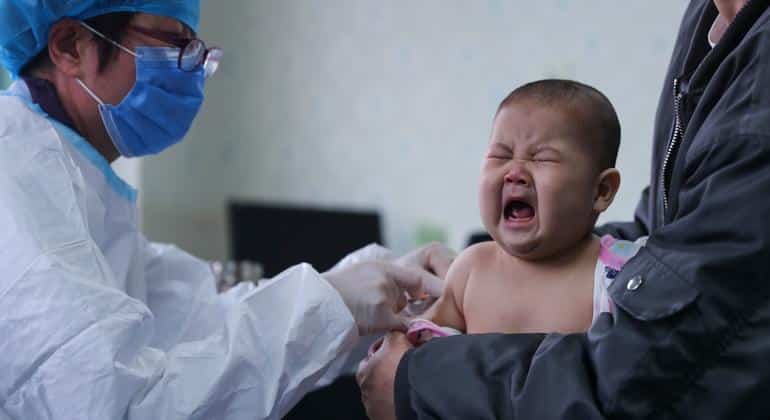Here’s the translation to American English:
—
In 2024, 89% of infants worldwide, representing nearly 115 million children, received at least one dose of the diphtheria, tetanus, and pertussis (DTaP) vaccine. Additionally, 85% of them, about 109 million, completed the three-dose series. These data, released by the World Health Organization (WHO) and UNICEF, show a slight increase in vaccination coverage compared to 2023, with an increase of 171,000 infants who received at least one vaccine and one million more who completed the three doses.
Despite these advancements, significant concerns remain. About 20 million infants did not receive any dose of the DTaP vaccine, with 14.3 million of them completely unvaccinated. This figure exceeds the proposed goal for 2024 by four million and represents an increase of 1.4 million compared to 2019, the baseline year for assessing progress.
WHO Director-General Tedros Adhanom Ghebreyesus emphasized the importance of vaccines by stating that they “save lives and enable the development” of communities. Although the increase in the number of vaccinated children is a positive aspect, Ghebreyesus warned of the challenges that still persist, such as cuts in aid and misinformation regarding vaccine safety. He highlighted that these threats could reverse decades of progress in child health.
The lack of vaccination is attributed to various factors, including limited access to immunization services, supply disruptions, conflicts, and misinformation. Particularly concerning is the fact that one-quarter of infants live in 26 countries affected by conflicts, which accounts for half of all unvaccinated children globally. In these countries, the number of unvaccinated infants increased from 3.6 million in 2019 to 5.4 million in 2024, reinforcing the need to include immunization in humanitarian response strategies.
Catherine Russell, Executive Director of UNICEF, called for immediate action, emphasizing that “no child should die from a disease we know how to prevent.” Despite the obstacles, countries linked to the Gavi Vaccine Alliance have continued to introduce and expand their vaccine offerings, including those that protect against human papillomavirus (HPV) and other diseases. Sania Nishtar, CEO of Gavi, noted that lower-income countries have managed to protect a record number of children, with a significant increase in vaccination coverage rates.
In light of this reality, WHO and UNICEF have urged governments and their partners to close the funding gap in the upcoming strategic cycle of Gavi, strengthen immunization in conflict contexts, and counter misinformation surrounding vaccines.
—
Feel free to ask if you need any changes or further assistance!
via: MiMub in Spanish










